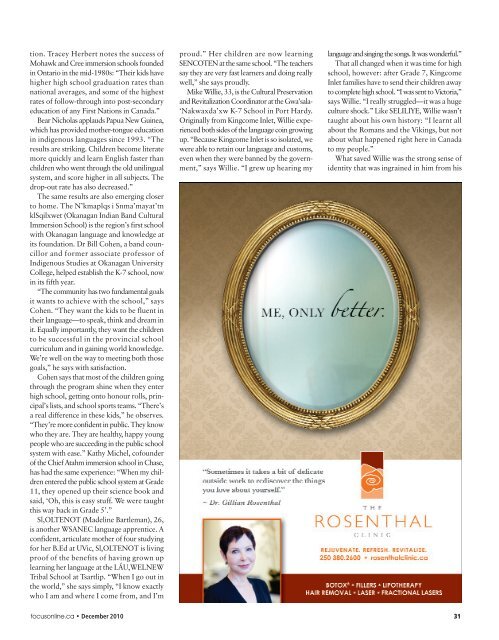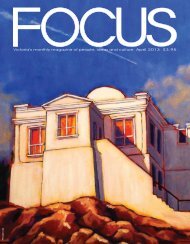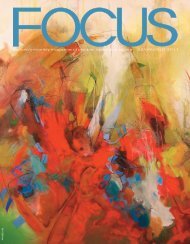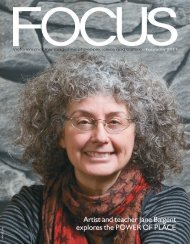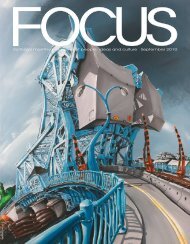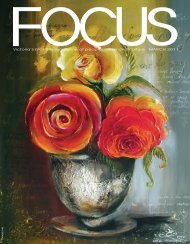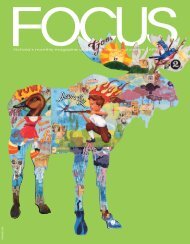****December 2010 Focus - Focus Magazine
****December 2010 Focus - Focus Magazine
****December 2010 Focus - Focus Magazine
Create successful ePaper yourself
Turn your PDF publications into a flip-book with our unique Google optimized e-Paper software.
tion. Tracey Herbert notes the success of<br />
Mohawk and Cree immersion schools founded<br />
in Ontario in the mid-1980s: “Their kids have<br />
higher high school graduation rates than<br />
national averages, and some of the highest<br />
rates of follow-through into post-secondary<br />
education of any First Nations in Canada.”<br />
Bear Nicholas applauds Papua New Guinea,<br />
which has provided mother-tongue education<br />
in indigenous languages since 1993. “The<br />
results are striking. Children become literate<br />
more quickly and learn English faster than<br />
children who went through the old unilingual<br />
system, and score higher in all subjects. The<br />
drop-out rate has also decreased.”<br />
The same results are also emerging closer<br />
to home. The N’kmaplqs i Snma’mayat’tn<br />
klSqilxwet (Okanagan Indian Band Cultural<br />
Immersion School) is the region’s first school<br />
with Okanagan language and knowledge at<br />
its foundation. Dr Bill Cohen, a band councillor<br />
and former associate professor of<br />
Indigenous Studies at Okanagan University<br />
College, helped establish the K-7 school, now<br />
in its fifth year.<br />
“The community has two fundamental goals<br />
it wants to achieve with the school,” says<br />
Cohen. “They want the kids to be fluent in<br />
their language—to speak, think and dream in<br />
it. Equally importantly, they want the children<br />
to be successful in the provincial school<br />
curriculum and in gaining world knowledge.<br />
We’re well on the way to meeting both those<br />
goals,” he says with satisfaction.<br />
Cohen says that most of the children going<br />
through the program shine when they enter<br />
high school, getting onto honour rolls, principal’s<br />
lists, and school sports teams. “There’s<br />
a real difference in these kids,” he observes.<br />
“They’re more confident in public. They know<br />
who they are. They are healthy, happy young<br />
people who are succeeding in the public school<br />
system with ease.” Kathy Michel, cofounder<br />
of the Chief Atahm immersion school in Chase,<br />
has had the same experience: “When my children<br />
entered the public school system at Grade<br />
11, they opened up their science book and<br />
said, ‘Oh, this is easy stuff. We were taught<br />
this way back in Grade 5’.”<br />
Sl,OLTENOT (Madeline Bartleman), 26,<br />
is another WSANEC language apprentice. A<br />
confident, articulate mother of four studying<br />
for her B.Ed at UVic, Sl,OLTENOT is living<br />
proof of the benefits of having grown up<br />
learning her language at the LÁU,WELNEW<br />
Tribal School at Tsartlip. “When I go out in<br />
the world,” she says simply, “I know exactly<br />
who I am and where I come from, and I’m<br />
proud.” Her children are now learning<br />
SENCOTEN at the same school. “The teachers<br />
say they are very fast learners and doing really<br />
well,” she says proudly.<br />
Mike Willie, 33, is the Cultural Preservation<br />
and Revitalization Coordinator at the Gwa’sala-<br />
‘Nakwaxda’xw K-7 School in Port Hardy.<br />
Originally from Kingcome Inlet, Willie experienced<br />
both sides of the language coin growing<br />
up. “Because Kingcome Inlet is so isolated, we<br />
were able to retain our language and customs,<br />
even when they were banned by the government,”<br />
says Willie. “I grew up hearing my<br />
language and singing the songs. It was wonderful.”<br />
That all changed when it was time for high<br />
school, however: after Grade 7, Kingcome<br />
Inlet families have to send their children away<br />
to complete high school. “I was sent to Victoria,”<br />
says Willie. “I really struggled—it was a huge<br />
culture shock.” Like SELILIYE, Willie wasn’t<br />
taught about his own history: “I learnt all<br />
about the Romans and the Vikings, but not<br />
about what happened right here in Canada<br />
to my people.”<br />
What saved Willie was the strong sense of<br />
identity that was ingrained in him from his<br />
focusonline.ca • December <strong>2010</strong><br />
31


